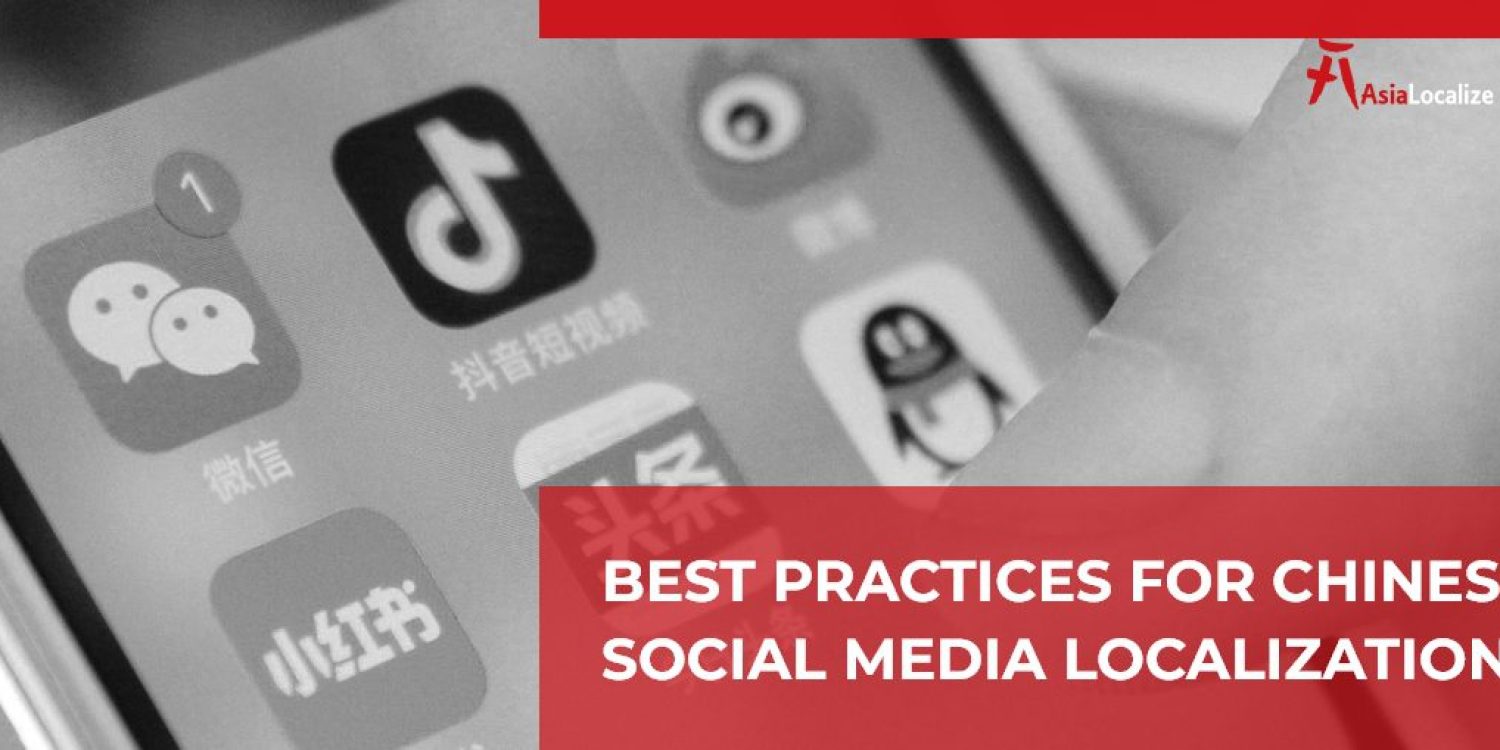You’ve already decided to take your business global. Then you can’t overlook the Chinese market. China is the most populated country worldwide, presenting lucrative opportunities for businesses of all industries. International expansion requires, first and foremost, a localization strategy for your business’s digital presence. And for China, in particular, localizing your social media is imperative. Choosing not to means missing out on the potential acquisition of over 1.03 billion social media users.However, Chinese social media localization is no light task. In this post, we have developed a guide to help you navigate Chinese social media localization challenges, backing you up with key tips and best practices. Let’s get started!
What is Chinese Social Media Localization?
To begin, let’s clarify the definition of localization and distinguish it from translation. The main focus of translation is text, conveying the meaning from one language to another, while localization is a more complicated process.
Localization gives your content, and your entire product or service, the feel and sense as if it’s created and meant for your target audience. So, it goes far beyond rendering text; it involves considering cultural and contextual elements as well as the audience’s preferences.Accordingly, Chinese social media localization is the process of adapting your social media presence to your potential Chinese customers’ expectations and norms. Truth be told, Chinese social media localization is complex. From understanding the market’s behavior to the social media landscape and the most suitable platform for your business, you need a solid social media localization strategy to appeal to the Chinese market.
That’s why it’s crucial to have the support of a professional Chinese social media localization company at every step of your expansion.
Why Chinese Social Media Localization Matters
Do you know that 66% of content impressions and 72% of brand social media engagement originate from local pages?
These numbers significantly drop if you choose for your business to only speak your native language or English.
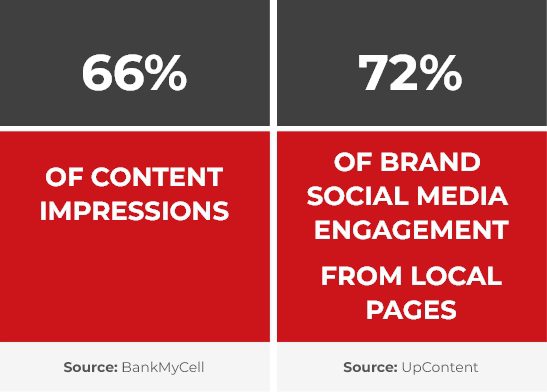
There are 1.03 billion social media users in China, which means that you are now tapping into a market home to 72% of the total Chinese population, according to DataReportal. And with only 6% of the previous percentage speaking English at any level, operating only in English in the Chinese market means expansion-killer.
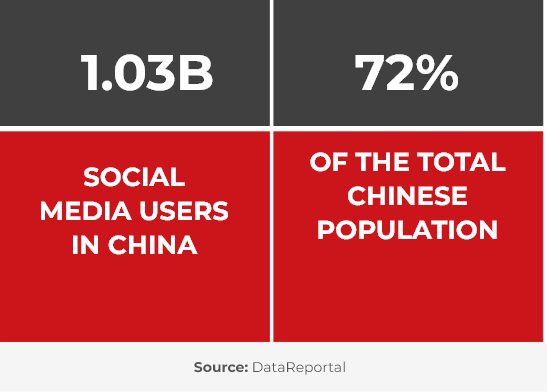
So, why not reach out with localized social media content for Chinese-speaking regions?
What could be staggering is that 48% of foreign corporations don’t pull it off in the Chinese market. The most significant factor is the lack of understanding of Chinese culture and language knowledge.
But, if you are going to do it, you need to do it right! Quality localized content is key. Otherwise, you don’t want to end up the way Dolce and Gabanna (With Chopsticks) 2018’s Ad did.
Why High-Quality Chinese Social Media Localization Matters Most
Here is what happened to Dolce and Gabbana when they didn’t invest enough in professional Chinese localization:
Through a 3-video Ad campaign on the Chinese social media platform Weibo to advertise its upcoming Shanghai runway extravaganza, or “The Great Show,” as dubbed, Dolce and Gabanna provoked the Chinese audience’s outrage and uproar.
This campaign ended with a public apology. And that’s not all; the backlash was so severe that the show was canceled, and the hashtag “#DGTheGreatShowCancelled” was trending and gathered nearly one billion views.
The ad portrayed an outdated view of Chinese culture and made fun of its traditions. So, the Chinese audience considered the campaign offensive and racistic.

5 Best Practices for Chinese Social Media Localization
With the Chinese market’s limitless opportunities for business growth, establishing a strong multimedia online and social media presence has become critical. And to achieve the impactful social media presence you strive for, your social media has to connect with the Chinese culturally and linguistically.
However, it’s more challenging than it seems! That’s why we’ve got you some helpful tips that will help you beat any odds along the way and increase your chances of international success.
1. Understand the Chinese Market and Local Culture
Before dipping your fishing poles and entering the Chinese market, preparing for what’s coming is crucial. When building your marketing and localization strategy, you should study Chinese consumers’ buying habits and behaviors and reflect on their culture and preferences. Here, the goal is to meet your Chinese customers’ expectations while staying faithful to your brand identity. So, your social media localization strategy should entail the following:
- Target Regions and Dialects
- Cultural and Societal Values of these Regions
- Purchasing Behaviors and Habits
- Search Pattern and Search Engine Usage
2. Pick the Right Chinese Social Media Platform for Your Business
In spite of the fact that Facebook, Twitter, and Instagram dominate the Western world, there are other favorite social media platforms in China. Each has its own unique characteristics and serves a specific audience.
Here is a list of the most well-known search engines for some of the Asian countries:
- China: Baidu, Shenma Inc., Sogou, Google China, and Yahoo! Hong Kong
- Japan: Goo, Infoseek Japan, Google Japan
- Korea: Daum and Naver
Let’s go in-depth into the favorite Chinese social media platforms and their own usage:
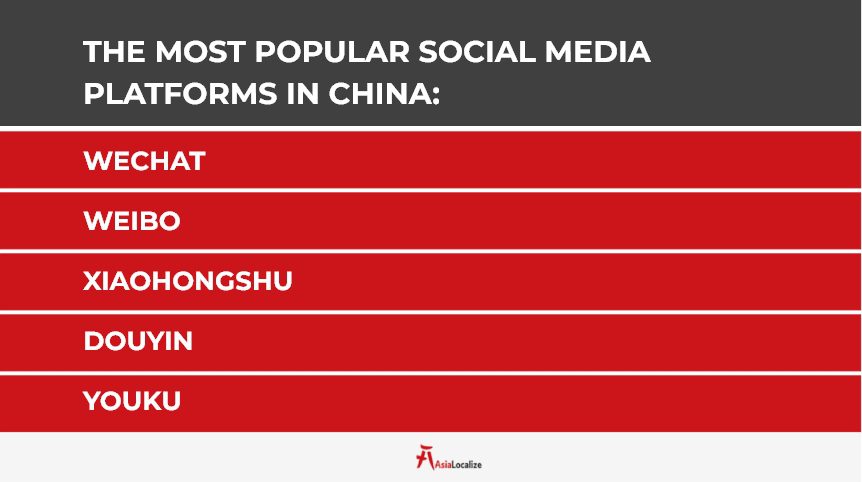
Known as Weixin in China, WeChat is China’s favorite social media app, with over 1 billion Chinese users. It is a mobile messaging platform that’s similar to WhatsApp but has exceptional social media features. It also serves as a payment app that allows users to pay directly.
Communicating through WeChat can establish your credibility internationally, giving you the push you need for success in the Chinese market.

Weibo is an excellent microblogging app with the same features as Twitter and Facebook. It has become the go-to source for over 593 million people who want to engage in meaningful conversations and exchange valuable information.
The platform is ideal for individuals who wish to stay up-to-date with the latest news and trends as well as connect with others who share similar interests.
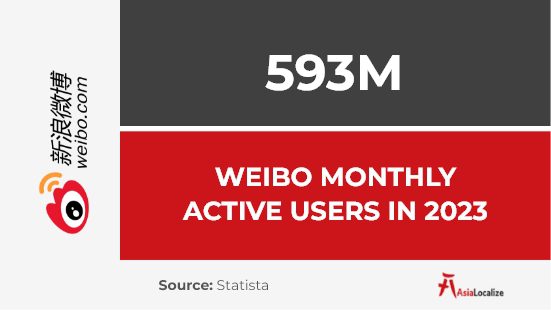
- Xiaohongshu (Little Red Book or RED)
It’s an eCommerce platform with unique social media and live-streaming features. This app can be a powerful tool for any eCommerce business wanting to create a customer feedback loop and connect effectively since Chinese shoppers use it to share their reviews about different products and services.

- Douyin
This video-sharing platform is one of the most popular apps in China, similar to the global platform “Tiktok,” with more than 750 million Chinese users daily.
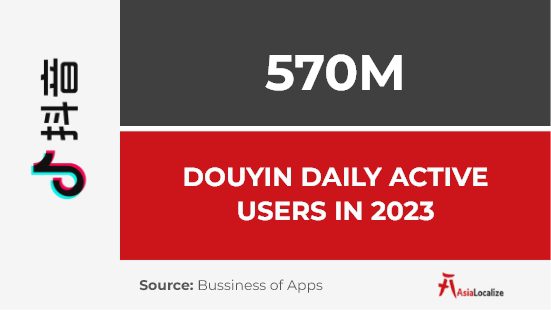
- Youku
It’s one of China’s top video and streaming platforms, similar to YouTube.
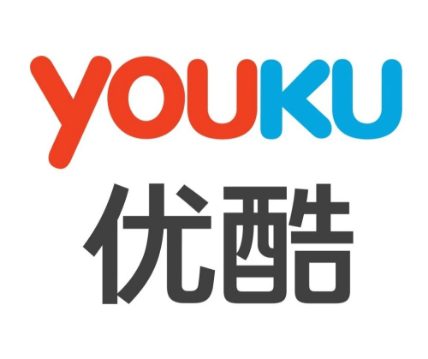
3. Localize Visuals
A comprehensive Chinese social media localization strategy doesn’t only involve text; visuals, graphics, and more should also be adapted to Chinese preferences. Here are some of the essential aspects you should keep in mind when localizing your social media content:
- Images and Graphics
- Symbols
- Colors
- Emojis
- Memes
- Banners and Logos
- Date Formats, Currencies, and Units of Measurement
4. Never Underestimate the Power of Chinese Influencers
Nowadays, influencer marketing has become an indispensable part of digital marketing strategies. With millions of followers, some influencers can help foreign companies establish credibility and gain the trust of their Chinese-speaking target audience.
However, choosing the right man for the job is crucial, so you should select the ones that only appeal to your target audience and benefit your brand.
5. Have the Support of a Professional Chinese Social Media Translation Company
Do you think automatic social media translation can do the job? Basically, not. It can cost you a lot (not money), hurting your reputation for longer than expected.
From the outset, save yourself from the consequences of poor and ineffective (possibly offensive) social media localization and have a professional Chinese social media translation company in your corner. This can help you get a customized social media translation and localization solution that is perfect for your business as well as your target Chinese-speaking markets.
Asialocalize Social Media Localization Services: A Comprehensive Localization Solution
Expanding into the Chinese market can be challenging for any industry. To succeed, it’s essential to team up with a professional Chinese social media translation and localization company that can provide the necessary resources to help you stand out among your competitors. And that’s precisely what we can help you get at AsiaLocalize. We deliver end-to-end social media translation solutions to help you achieve this and more.

